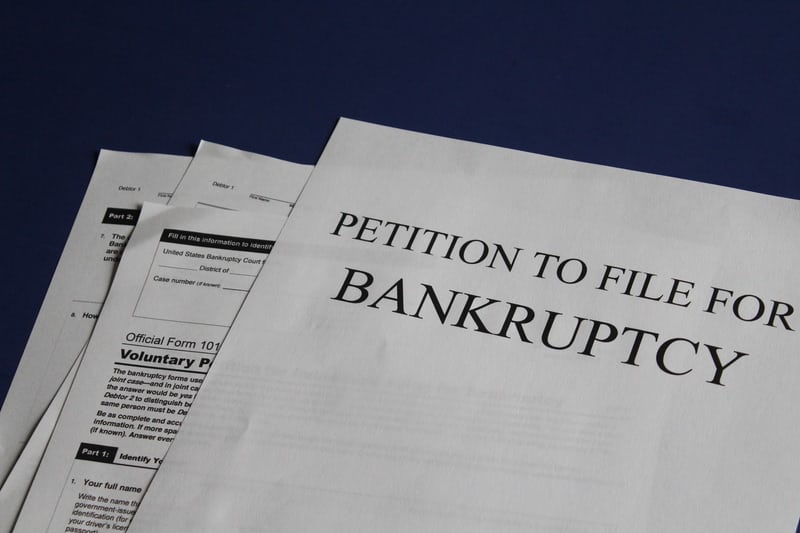Annual bankruptcy filings in the US for 2020 totaled 544,463. The number of cases fell drastically compared to more than 770,000 bankruptcy filings in 2019, citing great news. However, many individuals and businesses are still struggling with challenging financial circumstances. Let’s see Bankruptcy Myths and Facts you should know.
The very thought of filing for bankruptcy can be overwhelming. Many people think of the possibility of having to file for bankruptcy as something that can cripple them. Are you also worried about the consequences of filing for bankruptcy? You are not alone.
You should know that most of the aspects about filing for bankruptcy that scares you are based on bankruptcy myths. If you are considering bankruptcy, it is important to understand the consequences of it and how it works. However, it is also equally important to learn how it impacts you to determine whether it is the best way for you to proceed.
This post will serve as a guide to help you understand some crucial bankruptcy myths and facts that can help you make a well-informed decision.
Table of Contents
6 Bankruptcy Myths and Facts You Should Know
Here are some of the bankruptcy myths and the reality behind them that you should know if you are considering filing for bankruptcy.
1. Declaring bankruptcy will destroy your credit score
This is completely untrue. Filing for bankruptcy does not destroy your credit score. In fact, it does the opposite because your debts are discharged and the negative consequences of not paying your debt are removed from your credit report when you declare bankruptcy. While it does not always happen this way, there is a chance that filing for bankruptcy can increase your credit score.
You will no longer be piling on more interest on your debt, there will be no late fees to worry about, and the collection fees will also disappear. It is true that the bankruptcy itself will remain on your credit report for several years. However, it will not necessarily have an adverse impact on your credit score.
Eventually, the bankruptcy will be removed and you will have a clean credit report.
2. You will never get credit again if you file for bankruptcy
Many people are afraid to file for bankruptcy because they think that lenders will never work with them again. Yes, the bankruptcy will remain on your credit report for up to 10 years. But that does not automatically mean that you will not qualify for any loans or credit. You may have to contend with getting higher interest rates because of the bankruptcy on your credit report. However, you can begin rebuilding your credit as soon as your debts are discharged and your bankruptcy closes.
We highly recommend that you avoid getting yourself into debt again. Consider working with an experienced financial planner who can guide you on how to spend your money responsibly and avoid getting into debt-related problems again.
3. You will have to forfeit all your property
Most people think that they will lose all their property when they file for bankruptcy. However, you can actually keep most of your possessions. Chapter 7 and Chapter 13 bankruptcies are two of the most common types of bankruptcies that individuals file. The type of bankruptcy you file can make a difference in how they consider your assets.
Chapter 7 bankruptcies are no-asset cases. It means that you don’t have to give up any personal possessions, especially those necessary for your daily life. Most lenders are likely going to disregard many of the items that are exempt from Chapter 7 bankruptcies, but that is not a guarantee.
Filing for Chapter 13 bankruptcy infers that you keep your assets. The assets are then valued and the value is incorporated into your repayment plan. An experienced bankruptcy attorney can help you make the best possible decision on which type of bankruptcy you should file based on your situation.
4. You can only file for bankruptcy once in your life
While you might be struggling with the possibility of having to file for bankruptcy, filing for it again is not something you want to think about. Even if you find yourself back in the clear, there is no telling what the future holds. It is possible that you can find yourself in a financially challenging position in the future. Many people believe that you can file for bankruptcy only once in your life.
However, the truth is that you can file for it multiple times, if necessary. You can file for Chapter 7 bankruptcy once every eight years, and Chapter 13 bankruptcy after every two years. Of course, this does not mean that you should be more relaxed about improving your spending practices because you can file for bankruptcy again.
It is challenging to recover from several bankruptcies and it can have an adverse and long-lasting impact on your credit score.
5. Filing for bankruptcy will discharge your entire debt
Many people who want to file for bankruptcy think that it can help them get rid of all their debts and offer them a clean slate. However, bankruptcy does not work that way. There are several financial obligations that will never go away, even after filing for bankruptcy. Some of the things you will still have to contend with after declaring bankruptcy include taxes, alimony, child support, and any debt as a result of fraud that you might have committed.
Unfortunately, student loans are also not forgiven despite filing for bankruptcy. An experienced bankruptcy lawyer can provide you with a more detailed explanation for which of your debts you will still need to repay and which of them might be forgiven. One good news is that most cases see your personal loans, medical bills, and credit card debt forgiven after filing for bankruptcy.
6. Filing for bankruptcy is a dishonest practice
A completely undeserved bankruptcy myth is that it is only filed by dishonest people who are trying to avoid going to jail. However, most people who file for bankruptcy are good, honest, and hardworking people, just like you, who have found themselves in a challenging financial situation.
Sure, there are always going to be people who file for bankruptcy for dishonest purposes. However, most people who file for it are in desperate need of financial relief and seek the advantages offered by bankruptcy to get a second chance.
If bankruptcy was a dishonest practice, it wouldn’t even exist. Congress designed bankruptcy laws to help hardworking people who have fallen on bad times to eliminate their debts and move on with their lives.
Are You Thinking Of Filing For Bankruptcy?
Hopefully learning these bankruptcy facts has given you some peace about filing for bankruptcy. While you will spend some time rebuilding your credit, accepting that you can’t pay your bills and doing something about it can reduce a great deal of stress in your life. The best course of action is to find a reputable bankruptcy attorney to handle the filing for you.
If you are ready to file for bankruptcy, having the right bankruptcy lawyer on your side can make a world of difference in helping you. Consider working with the reputable bankruptcy attorneys at Welch Law Firm by contacting them today.











